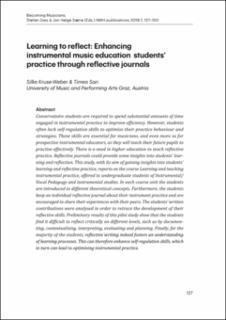| dc.contributor.author | Kruse-Weber, Silke | |
| dc.contributor.author | Sari, Timea | |
| dc.date.accessioned | 2021-11-01T14:30:36Z | |
| dc.date.available | 2021-11-01T14:30:36Z | |
| dc.date.issued | 2019 | |
| dc.identifier.citation | I: Becoming musicians. Student involvement and teacher collaboration in higher music education, s. 127-150 | en_US |
| dc.identifier.isbn | 978-82-7853-272-0 (pdf) | |
| dc.identifier.issn | 2535-373X (elektronisk utgave) | |
| dc.identifier.uri | https://hdl.handle.net/11250/2827002 | |
| dc.description | Paper from the conference "Becoming Musicians. Student involvement and teacher collaboration in higher music education" - Oslo, October 2018. | en_US |
| dc.description.abstract | Abstract -
Conservatoire students are required to spend substantial amounts of time engaged in instrumental practice to improve efficiency. However, students often lack self-regulation skills to optimise their practice behaviour and strategies. These skills are essential for musicians, and even more so for prospective instrumental educators, as they will teach their future pupils to practise effectively. There is a need in higher education to teach reflective practice. Reflective journals could provide some insights into students’ learning and reflection. This study, with its aim of gaining insights into students’ learning and reflective practice, reports on the course Learning and teaching instrumental practice, offered to undergraduate students of Instrumental/ Vocal Pedagogy and instrumental studies. In each course unit the students are introduced to different theoretical concepts. Furthermore, the students keep an individual reflective journal about their instrument practice and are encouraged to share their experiences with their peers. The students’ written contributions were analysed in order to retrace the development of their reflective skills. Preliminary results of this pilot study show that the students find it difficult to reflect critically on different levels, such as by documenting, contextualising, interpreting, evaluating and planning. Finally, for the majority of the students, reflective writing indeed fosters an understanding of learning processes. This can therefore enhance self-regulation skills, which in turn can lead to optimising instrumental practice. | en_US |
| dc.language.iso | eng | en_US |
| dc.publisher | Norges musikkhøgskole | en_US |
| dc.relation.ispartofseries | NMH-publikasjoner;2019:7 | |
| dc.title | Learning to reflect: Enhancing instrumental music education students’ practice through reflective journals | en_US |
| dc.type | Chapter | en_US |
| dc.type | Peer reviewed | en_US |
| dc.subject.nsi | VDP::Humaniora: 000::Musikkvitenskap: 110::Musikkpedagogikk: 114 | en_US |
| dc.source.pagenumber | S. 127-150 | en_US |
